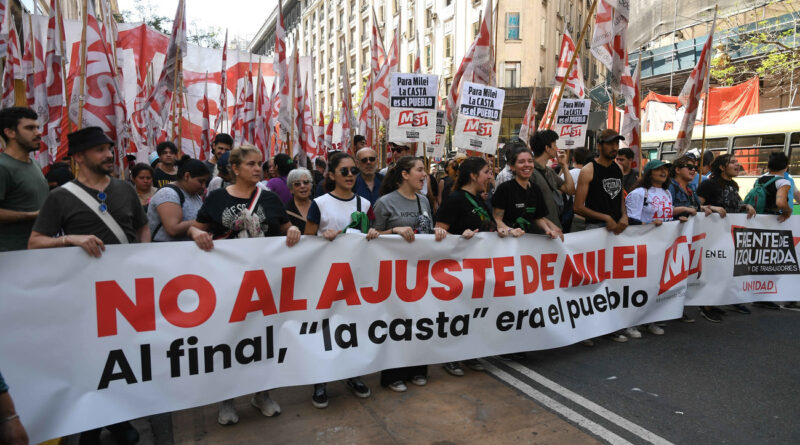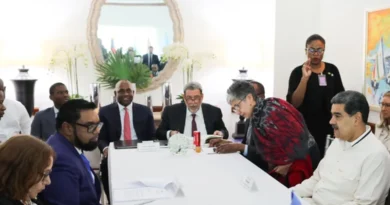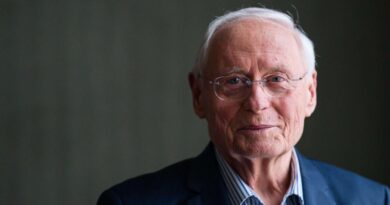Milei's wild adjustment will have a full impact on the most affected sectors
CECILIA VALDEZ
"It is the first time that someone wins by saying that they are going to make an adjustment", but that the adjustment, although it will be a "monumental fiscal adjustment" to balance the public accounts, this time "the Argentines are not going to do it, it is going to be make caste,” announced the current president of the Argentines, Javier Milei, during the campaign. Although Milei has pointed out on numerous occasions his admiration for former president Carlos Saúl Menem, unlike the Riojan - who admitted to having hidden his chips during the electoral process - the far-right boasted about it. However, with Monday's diary, it is already possible to say that Milei did not tell the whole truth either.
Milei assured during the campaign that the cuts would be made in political spending and that from there would come the 15% of the cut in the state budget that was needed to put the accounts in order, an idea that many questioned him and that has not taken him long to reformulate. . For now, the measures announced by the new government imply an adjustment and a fierce devaluation, but also an unprecedented State Reform that, through a Decree of Necessity and Urgency, completely deregulates the economy with measures that will fully impact the sectors of the most punished economy that already coexist with a year-on-year inflation of 160%.
Economy
48 hours after his inauguration, Luis Caputo, the new Minister of Economy, announced nine economic measures, including a 50% devaluation of the currency, which promotes greater inflation and a rise in prices; a reduction in transportation and energy subsidies, that is, increases in electricity, gas, water, buses and trains; the paralysis of public works, which will be financed by the private sector; and a drastic reduction in government structures, with a 50% reduction in ministries, from 18 to 9, and a 49% reduction in secretariats, from 106 to 54. It also ordered the suspension of institutional advertising in the media. of communication, and clarified that, for the moment, social plans or assistance to the lowest-income sectors will not be withdrawn. “We are here to solve this problem at its roots, so that there is no more inflation or poverty,” said Caputo. “We are facing a historic opportunity,” in which Javier Milei, “has managed to make society understand that the problem is that there is no money.”
"There is no money”, is the new motto of the current government. The paradox is that whoever has just taken the reins of the Ministry of Economy may believe that he is part of the solution, but he is also part of the problem, and has generated part of the most serious consequences of that problem. Caputo was Minister of Finance in the government of the former president, Mauricio Macri (2015-2019), and, as such, he doubled the debt with the private sector in just two years and five months of administration, and tripled it with multilateral organizations; while as president of the Central Bank (three months in 2018) he failed to comply with an agreement with the IMF, with which the organization requested his replacement. Today, the Argentine justice system is advancing a case against him for the alleged concealment of his participation in the company Noctua, which managed hundreds of millions of dollars in tax havens, and he is one of the defendants in the case that investigates the loan. record of 45 million dollars from the IMF (2018), the largest in the history of the organization.
Bullrich Protocol
But “solving the root problem,” as the government proposes, has a price, and the new management seems willing to pay it. Although a part of society may want to give the new government time to verify the effectiveness, or not, of its measures; It may also be that the 50% of the population that already lives in poverty has no room to continue holding on. All these ultra-liberal economic formulas that the new government intends to carry out have already been tested, and have already demonstrated their failure. For the rest, and although Milei won based on an anti-caste speech, defenestrating traditional politicians and preaching the idea of blowing up everything, it did not take him even hours to backtrack on his most disruptive ideas and engage in power negotiations with that same caste.
All the announcements made by Milei since he was elected resonate in the worst way in the memory of Argentines. In the '90s, a total of 67 public companies were privatized and, in this way, the State not only decreased its participation in the economy, but also renounced the management of resources and certain productive activities that were otherwise strategic. Menem not only privatized everything he found along the way and decapitalized Argentina, but in 1991 he established a convertibility plan (Law 23.928), through which the Argentine peso became worth the same as the US dollar. Prior to convertibility, Argentina had reached an accumulated inflation rate of 1989% in 2.014,6, but although Menem managed to reduce inflation to 0% five years later, he fueled a time bomb that led to the 2001 crisis and the famous corralito. What follows is known to all: a president who leaves the Casa Rosada by helicopter, a wave of protests, deaths and a political and institutional crisis rarely seen. Finally, in 2002 the parity between the peso and the dollar was ended, dollar deposits were pesified and the devaluation multiplied poverty. The country also stopped paying its foreign debt.
But, and although experience shows the opposite, the current government insists that this plan will once again make Argentina a world power (if it ever was), and will allow Argentines to live the way they deserve ( although it does not clarify which Argentines it refers to). Although, just in case, he covers his back. A few hours after Caputo's announcement, the Minister of Security, Patricia Bullrich - who also held that portfolio in the Macri government, - presented "a protocol for the maintenance of public order" that seeks to ensure free movement on routes and streets, and tries to contain social unrest that could translate into cuts and pickets. “The law is not half fulfilled; It is fulfilled or it is not fulfilled,” said the former candidate for the presidency of Together for Change, who became an official of the current government after her defeat in the first round.
Social and human rights organizations not only rejected the protocol, but also made the corresponding complaints to international organizations. More than 1.700 union, social, human rights, student and political organizations denounced the protocol before the Office of the United Nations High Commissioner for Human Rights and the Inter-American Commission on Human Rights (IACHR) and requested “that the application of the measures that seek to prevent and repress public demonstrations.”
The caste
One of Milei's great campaign promises, and the first to be broken, was to end caste, that is, with traditional politicians and their privileges. Since they were elected, Milei and his force, La Libertad Avanza, have done nothing other than negotiate the different government positions with those they previously claimed to defenestrate. The lack of its own political structure, inexperience and a strong capacity for improvisation have characterized a government transition in which it convened (and met) with all types of politicians (always aligned to the right), many of whom He gave them positions, even at the cost of displacing those who belonged to their hardest core. Along the way, Carolina Páparo or Ramiro Marra remained, or were relegated, but also her vice, Victoria Villarruel, who was expected to be in charge of the appointments of the Security and Defense portfolios, which Milei finally attributed to the two representatives. of the Together for Change formula, Patricia Bullrich and Luis Petri.
For Milei, the transition meant rapprochement with some, but distancing with others. Neither her relationship with the denier Victoria Villarruel nor with Mauricio Macri - who guaranteed her support in the campaign - were exempt. Although Villarruel did not achieve everything she wanted, the current vice president - who is a political cadre with strong experience and participation in groups that claim state terrorism and defend genocidal prisoners in trials against humanity - surprised everyone in her first session. as president of the Upper House. Villarruel formed a parliamentary majority that left Peronism out of all positions of power in the body, which could make it easier for Milei to approve many of the laws and projects that she wants to carry out.
For his part, Macri, who was pointed out as the great playmaker in the shadows, also failed to make his most precious piece fit: Cristian Ritondo in the presidency of the Chamber of Deputies, but some of the leaders of his party have been placed in key positions of the future management: Luis “Toto” Caputo in the Ministry of Economy and Patricia Bullrich in Security. Precisely, security and economy, which seemed to be two of the places where Milei, as an economist, and his vice Victoria Villarruel, as a security specialist, seemed to step the strongest, have been two of the places that have given in most easily, demonstrating, not not only the lack of a program to defend, but also the lack of those responsible to carry it out and an enormous capacity for improvisation.
State reform
"Everything that can be privatized will be privatized”, with this phrase Javier Milei ratified one of his main campaign promises on the same Monday after his victory. The phrase resonates in the memory of Argentines because it is very similar to that of Roberto Dromi, the then Minister of Public Works and Services of former President Carlos Saúl Menem, who today advises Milei.
Ten days had not passed since his inauguration when Milei announced one of his main campaign promises: State Reform. This is an enormous measure that has no precedent in Argentine history and that the new president is preparing to implement through a Decree of Necessity and Urgency (DNU), which includes 366 articles. Among the main measures are: the repeal of price controls, the regulations that prevent the privatization of public companies and the Rental Law; the flexibility of the labor regime; and the modification of the health system and the civil and commercial code, among others. The decree also authorizes the transfer of the share package of Aerolíneas Argentinas and the complete deregulation of the airline market, and the Internet market that will allow “the entry of companies like Starlink”, owned by magnate Elon Musk. Since Milei took over as president, he has had public exchanges (and winks) with Musk, via X (ex Twitter). Musk's emergence on the scene also raises fears for the future of the country's lithium, a market more than coveted by the businessman who could also benefit from the repeal of the National Mining Trade System and the Mining Information Bank, included in the DNU. The others who must be licking their lips at this time are those who have some type of interest in the purchase of Argentine territories, since the Land Law (26.737) was also repealed, for the Protection of the National Domain over the Property, Possession or Tenure of Rural Lands, a rule that limits the possibility of selling to foreigners lands that have important water sources or that are in border security zones. In Argentine Patagonia, there are constant complaints about land conflicts with foreign capital ranging from Joe Lewis, Ted Turner or Luciano Benetton, to emirs of Qatar or the United Arab Emirates, who surround the territories and, in this way, block access to water sources for the population of the area
Before referring to the DNU measures, and as he did in his investiture speech, Milei pointed to the inheritance received from the governments that preceded him and made reference to the fiscal deficit, which he points out as the cause of all the evils. He also confirmed that there will be extraordinary sessions of Congress and asked the opposition not to obstruct the reform. The announced DNU remains in force as of its publication in the Official Gazette and only loses validity if it is rejected by both Chambers, something that has never happened in democracy until now.
According to the conservative newspaper La Nación, the announcement of the decree, due to its magnitude, surprised even “the most powerful lobbies in Argentina, who remain astonished at the still indecipherable impact of so many measures in such dissimilar sectors.” . Those who do not come away from their astonishment are the citizens who are trying to survive with runaway inflation and their pulverized salaries, many of whom have been demonstrating with massive cacerolazos that are repeated throughout the country since the DNU was made public.
China and Brazil
However, Milei's plans could be compromised in its accounts on the side of international relations with Argentina's two main trading partners, China and Brazil. During the campaign, the far-right claimed that he would break relations with both countries because he considered them communist, and perhaps warned a little late that these two countries represent no more and no less than 35% of the country's trade. At this point, Milei seems to have regretted his words, or so, at least, is demonstrated by his renewed gestures towards them. On the one hand, and despite the fact that Milei personally sent his chancellor, Diana Mondino, to bring the letter of invitation to his inauguration, the president of Brazil, Lula da Silva, gave up attending and instead sent his minister of Foreign Affairs, Mauro Vieira. However, the one who was in the game was the former president, Jair Bolsonaro.
On China's side things don't seem to be going much better. For the inauguration of the new government, China sent Wu Weihua, vice president of the Standing Committee of the Chinese National People's Congress, as a representative. Even so, the relationship with that country may be deteriorating faster than expected, given that, in recent days, its president, Xi Jinping, decided to block a loan of 6500 billion dollars from the Central Bank and called in his ambassador in Argentina to his country, to report on Milei's first steps in the Casa Rosada and his plans in relation to projects that Xi Jinping considers essential in the southern country. After his inauguration, Milei sent a letter to China requesting the renewal of the loan, but this gesture does not seem to have been enough, and the lack of financing compromises the public accounts of the new government.
Milei's case challenges, due to its scope, the premise that any president enjoys a period of affair with citizens as soon as he takes office. The current president has not even been a month since his inauguration, but no one has ever dared to do so much in such a short time. We will now have to see what capacity to react an Argentine society accustomed to settling its conflicts at street level has, in the face of this enormous advance of far-right forces that threatens the most basic consensus of democracy.
Cecilia Valdez She is an Argentine journalist.













